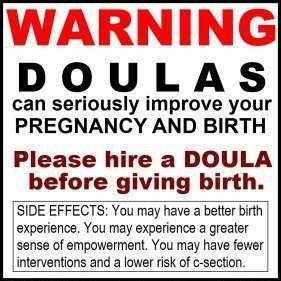The Purpose and Value of Labor Support (My essay for certification as a DONA Birth Doula)
I have been a Nurse for 25 years. My only area of specialty has been Neonatal ICU/Nursery Nursing. The best estimate is that I have been present at the births of more than 1,500 babies. I am pretty comfortable in the delivery room. Then, about 2 years ago, I was present at a birth attended by a doula. I was intrigued, I wanted to learn more about the role of a doula and a new passion was born (pardon the pun). I realized I wanted to broaden my knowledge base and get out of my comfort zone. As a nursery nurse you are only present at very end of the first stage of labor through the fourth stage of labor. Even being present for that short of a period of time, I was able to observe the difference with an un-medicated birth. The mothers appeared more joyous and blissful. They appeared to be able to bond, care for and breastfeed their babies with a greater ease. Now, having gone through training and being a doula at many births I can’t help but think how wonderful it is to be a part of something so important!
As I set forth on this new adventure I had a lot to learn. First, what is a doula? Doula is Greek for woman who serves. A doula provides emotional, physical and educational support. Doulas began to increase in popularity in the 1980’s primarily in response to the dramatically rising C-section rates. Women like Ina May Gaskin and Penny Simkin and Dr. Klaus and Dr. Kennel revolutionized the role of the Doula. Drs. Marshall Klaus and John Kennell, Phyllis Klaus C.S.W., M.F.C.C., Penny Simkin, PT, and Annie Kennedy, MA, all renowned experts in childbirth and newborns, founded DONA in 1992. It has become very important to me to define and communicate the role of a doula. Doulas do not perform medical exams or interventions. A DONA doula must adhere to the code of ethics outlined in the DONA International Code of Ethics for Birth Doulas. The DONA position paper “The birth doula’s contribution to modern maternity care” discussed the role of a doula as an advocate, without giving medical advice or making medical decisions, to ensure a safe and satisfying birth experience. The paper also discusses the importance of not projecting their own “values and goals onto the laboring woman”.
By far the most important role of a doula is to provide physical and emotional support throughout the pregnancy, during labor and after birth. Doulas use techniques such as imagery, massage, acupressure, hot/cold therapy and patterned breathing to help reduce a woman’s pain during labor. The Doula is not there to replace the father/family or the healthcare team; she is there to enhance them. Women who feel cared for are less likely to cross over from pain to suffering (one of the many things I learned from Penny Simkin).
When I tell people I am a doula, sometimes I get a response like “that’s great, you must enjoy it so much” . However, the more likely response is a blank stare and the question “what’s that?”. Next they usually say “oh, like a Midwife?” I actually like when someone asks me that. It is such an opportunity to educate people about the wonderful aspects of being a doula. The primary purpose of a Midwife or other healthcare provider is to attend to the medical needs of the mother to ensure the health of the mother and the safe delivery of the baby. The purpose of a doula is to provide the mother with physical, emotional and educational support. A mother or significant other at one point usually asks another important question “If I have a midwife and family present, why do I need a doula and won’t my labor nurse in the hospital help me?” A labor doula is trained for labor and birth to provide continuous support to the mother in a one-to-one setting. Unlike a Midwife or a Labor Nurse, the doula stays with the mother and works as a team with the family to attend to the mother’s emotional and physical needs. I often tell people, isn’t that a wonderful idea? The thought that there was one person with the mother that has no agenda other than to ensure the mother is cared for and that her wishes are respected. The Hodnett, et al. study that is referenced in a DONA position paper states that “the supported women had better outcomes” and that “obstetric outcomes were most improved and intervention rates most dramatically lowered”.
The World Health Organization has acknowledged that there are benefits to continuous labor support. Studies have shown the MULTIPLE benefits of having a Doula. The birth doula position paper from DONA cites that women who have a trained birth doula present are 28% less likely to have a cesarean section. They also cite that these same women are 31% less likely to have their labor augmented by the use of synthetic Oxytocin and 9% less likely to use any pain medication. These statistics prove that the presence of a trained birth doula decreases the ‘cascade of interventions’. Avoiding these interventions logically will improve obstetric outcomes and more significantly improving maternal and fetal mortality rates. The DONA position papers also cite that the mothers are 34% less likely to rate their childbirth experience negatively.
The birth of a child can be the most significant experience in a woman’s life. A doula, functioning within the scope of practice, can significantly improve a mother’s experience and improve maternal and fetal outcomes. In the end, I don’t think that there is there anything more important than improving society by improving birth even if it’s one birth at a time.










Written
on May 12, 2013